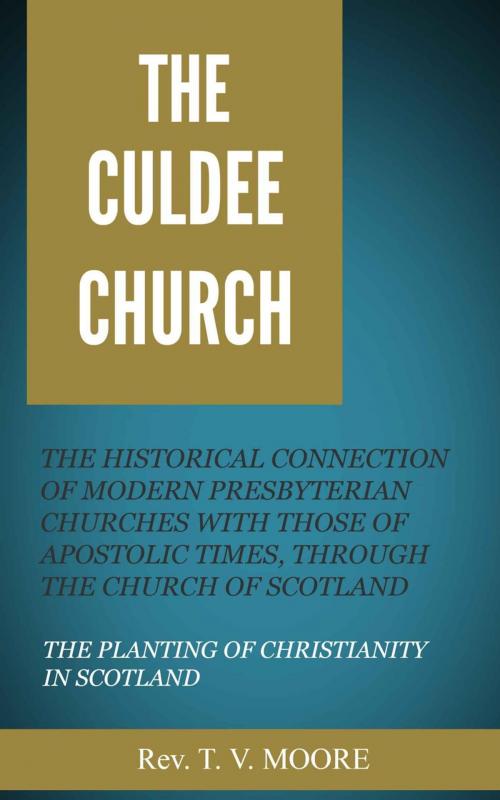The Culdee Church
Nonfiction, Religion & Spirituality, Christianity, Church, Church History, General Christianity| Author: | Moore, T. V. | ISBN: | 1230000309812 |
| Publisher: | Delmarva Publications, Inc. | Publication: | March 9, 2015 |
| Imprint: | Language: | English |
| Author: | Moore, T. V. |
| ISBN: | 1230000309812 |
| Publisher: | Delmarva Publications, Inc. |
| Publication: | March 9, 2015 |
| Imprint: | |
| Language: | English |
Having shown in a previous chapter that Christianity was introduced into Scotland very near to, if not during the lives of the Apostles, we now propose to show, that this primitive form of Christianity, as we find it in the Culdee Church, was substantially identical with that of the Reformed Church of Scotland.
We do not, of course mean to affirm a minute identity in the faith and forms of the Culdee Church and the present Presbyterian Church, or that every feature of that early Church was wise and scriptural; for this would be impossible, in churches whose outward surroundings were so entirely different. Even now, there are features in the Church system in a heathen country, different from those in a Christian; in a time of war, from a time of peace ; and it ought to be so in that religion which became " all things to all men, that by all means it might save some." What we do affirm, is that in this Culdee Church there was no Popery and no prelacy, that in its main features of doctrine and order, it was, as far as we can ascertain its peculiarities, Presbyterian, governed by Presbyters.
In tracing the history of this early Scottish Church, it will be remembered that when it was first established, Britain was a province of Rome, and continued to be until the evacuation of the island by the Romans, A. D., 420, when the disunion and anarchy which ensued, invited the predatory incursions of the Picts and Scots. To resist these formidable invaders, Vortigern, A. D.449, invited the Saxons to come and aid him, who, under the leadership of Hengist and Horsa, soon seized the country they came to protect, slaughtered the Britons, and drove the miserable remnant that escaped the sword, to the mountains of Wales and some of the more inaccessible islands. The Saxons, being Pagans, destroyed the Christianity that since the reign of Constantine had flourished in England, and restored the dark superstitions of the Druidic religion. For a century and a half this Pagan rule prevailed in England. But in Scotland, Ireland and Wales, it was otherwise. Scotland, never having been conquered by the Saxons, any more than by the Romans, retained her primitive faith, and with Ireland, enjoyed the light of a pure Christianity, while England was covered with the gloom of Paganism.
It was during this period of Saxon heathenism that the celebrated incident occurred which determined the religious history of England, by attracting to it the attention of the Church of Rome, which we may as well transcribe,' as it is one of those pebbles in the fountain that determine the channel of the future river. When Gregory the Great was a simple monk of St. Andrew, he saw some beautiful, faired-haired boys exposed for sale in the market-place of Rome. He inquired from whence they came. “From Britain." “Are they Christians'?" "They are still pagans." "Alas! that the Prince of Darkness should possess forms of such loveliness! That such beauty of countenance should want the better beauty of soul!" He asked of what nation they were. “Angles," was the reply. " Truly," he said, " they are angels ! From what province?" " That of Deira." " Truly, they must be rescued de ira, (from the wrath of God.") "What is the name of their King?" "..Ella." “Yea," said Gregory, " Allelulia must be sung in the dominions of that King."
Having shown in a previous chapter that Christianity was introduced into Scotland very near to, if not during the lives of the Apostles, we now propose to show, that this primitive form of Christianity, as we find it in the Culdee Church, was substantially identical with that of the Reformed Church of Scotland.
We do not, of course mean to affirm a minute identity in the faith and forms of the Culdee Church and the present Presbyterian Church, or that every feature of that early Church was wise and scriptural; for this would be impossible, in churches whose outward surroundings were so entirely different. Even now, there are features in the Church system in a heathen country, different from those in a Christian; in a time of war, from a time of peace ; and it ought to be so in that religion which became " all things to all men, that by all means it might save some." What we do affirm, is that in this Culdee Church there was no Popery and no prelacy, that in its main features of doctrine and order, it was, as far as we can ascertain its peculiarities, Presbyterian, governed by Presbyters.
In tracing the history of this early Scottish Church, it will be remembered that when it was first established, Britain was a province of Rome, and continued to be until the evacuation of the island by the Romans, A. D., 420, when the disunion and anarchy which ensued, invited the predatory incursions of the Picts and Scots. To resist these formidable invaders, Vortigern, A. D.449, invited the Saxons to come and aid him, who, under the leadership of Hengist and Horsa, soon seized the country they came to protect, slaughtered the Britons, and drove the miserable remnant that escaped the sword, to the mountains of Wales and some of the more inaccessible islands. The Saxons, being Pagans, destroyed the Christianity that since the reign of Constantine had flourished in England, and restored the dark superstitions of the Druidic religion. For a century and a half this Pagan rule prevailed in England. But in Scotland, Ireland and Wales, it was otherwise. Scotland, never having been conquered by the Saxons, any more than by the Romans, retained her primitive faith, and with Ireland, enjoyed the light of a pure Christianity, while England was covered with the gloom of Paganism.
It was during this period of Saxon heathenism that the celebrated incident occurred which determined the religious history of England, by attracting to it the attention of the Church of Rome, which we may as well transcribe,' as it is one of those pebbles in the fountain that determine the channel of the future river. When Gregory the Great was a simple monk of St. Andrew, he saw some beautiful, faired-haired boys exposed for sale in the market-place of Rome. He inquired from whence they came. “From Britain." “Are they Christians'?" "They are still pagans." "Alas! that the Prince of Darkness should possess forms of such loveliness! That such beauty of countenance should want the better beauty of soul!" He asked of what nation they were. “Angles," was the reply. " Truly," he said, " they are angels ! From what province?" " That of Deira." " Truly, they must be rescued de ira, (from the wrath of God.") "What is the name of their King?" "..Ella." “Yea," said Gregory, " Allelulia must be sung in the dominions of that King."















